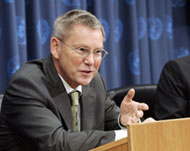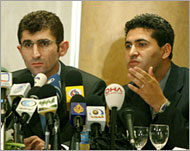Al-Hariri inquiry questions Syrians
United Nations investigators have begun questioning five senior Syrian officials over the assassination in February of Rafiq al-Hariri, the former Lebanese prime minister.

Diplomats in Vienna refused to identify the Syrians concerned, but according to the Lebanese press, the group includes Rustom Ghazale, the former head of military intelligence in Lebanon, and two of his deputies, Jamee Jamee and Samih Kashami.
The other two are said to be Abd al-Karim Abbas, the head of the Palestinian affairs department, Zaher Yussef, the communications chief.
As the questioning began, Bashar al-Assad, the Syrian president, said he expects the UN inquiry to “correct its mistakes”, notably concerning witness testimony.
The officials were reportedly staying at a hotel where Riad Daudi, the Syrian foreign ministry legal adviser and Damascus’s point man on the al-Hariri affair, is already staying.
They were accompanied by lawyers who could take part in the hearings, reports said.
One diplomat in Vienna said: “Five witnesses are being quizzed … The questioning could go on until Thursday.”
He said that Detlev Mehlis, the German prosecutor leading the inquiry, was not participating.
Interim findings
An interim report from Mehlis in October implicated senior Syrian officials in the assassination of al-Hariri in a bomb blast in Beirut on 14 February and criticised Syria for failing to co-operate fully with the investigation.
Since Syria agreed on 25 November to the hearings in Vienna after weeks of argument, Damascus and the UN have refused to reveal the identity or positions of the witnesses.
 |
|
Detlev Mehlis’s interim report |
A source close to the investigation last week ruled out Assaf Chawkat, the Syrian intelligence chief and brother-in-law of al-Assad.
Al-Assad told France 3 television on Monday: “In the first place, we expect this inquiry to be professional and the commission to correct the mistakes it made earlier in order to form a report that is fair and objective.
“There were witnesses who gave false testimony. Recently there has been a Syrian witness who admitted he was forced to provide evidence that backed up a particular point of view … That gives us cause for concern.”
No criminal proof
Hassam Hassam, a former Syrian intelligence agent, claimed that he testified against Chawkat, the president’s brother Maher al-Assad, and General Jamil al-Sayyad, the internal security chief, only under duress and had been offered large bribes.
 |
|
Hassam Hassam (L) said he had |
Hassam was quoted seven times in the inquiry’s interim report and al-Sayyad was arrested in September at Mehlis’s demand along with three other generals considered key players in Syria’s former dominance of Lebanon.
Al-Assad said: “There is no proof that Syria was involved. There is no criminal proof, and it was not in the interests of Syria to commit such an act.”
On Sunday, Mohammed Ghafri, the Syrian justice minister, said the inquiries were not trying to find the truth but were “taking place to encircle Syria and damage its national and patriotic positions”.
Press reports
Mahdi Dakhlallah, the information minister, was quoted in the official Al-Baath newspaper as saying: “Syria will continue to co-operate with the international commission of inquiry even if its structure is modified.
“But to reach the truth, it is necessary for the inquiry to happen in a professional manner far from political pressures exerted by Lebanese parties.”
Mehlis is scheduled to submit his final report to the UN Security Council on 15 December. Although his mandate runs out at the end of the year, Kofi Annan, the UN secretary-general, may extend it.